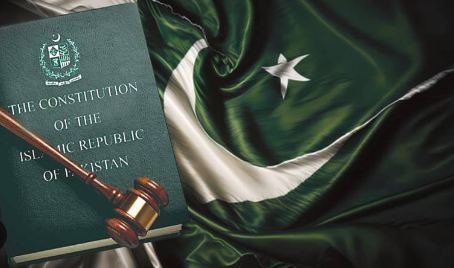Editorial
Ansar M Bhatti
With the establishment of the Constitutional Court (FCC), Pakistan has entered a new phase of judicial evolution. The political leadership proudly calls it a major reform designed to ease the burden on the Supreme Court and ensure swift adjudication of constitutional matters. But now that the court is operational, the real test begins: will justice finally be delivered, or will it merely be repackaged under a new title? For decades, Pakistan has suffered from an overburdened judiciary, chronic delays, and widespread violations of human rights. Tens of thousands of constitutional petitions remain pending. Citizens continue to suffer humiliating experiences in lower courts where cases drag on for years and where, in many instances, justice has to be “purchased” rather than secured. With the FCC now functional, the nation expects more than ceremonial inaugurations and official fanfare. It expects real results.
The state of Pakistan’s lower judiciary remains a matter of deep concern. Litigants often queue outside courtrooms for years, spending their life savings to prove what should have been resolved within months. Court staff, lawyers, and at times even judges become part of an environment where influence, money, and political connections can alter the course of justice. This is not merely judicial weakness; it is judicial paralysis. The establishment of the FCC offers an opportunity to begin cleaning up this system, but the responsibility does not rest on one institution alone. Reforms in civil and criminal procedures, digitization of case management, transparent monitoring systems, and strict accountability of judicial officers are urgently needed. Unless the lower judiciary is repaired and strengthened, no top-tier court—regardless of its mandate—can deliver justice at the grassroots level.
One of the most pressing issues surrounding the newly formed Constitutional Court is the perception of its independence. Questions began to arise even before its first significant judgment. Critics argue that the selection of judges appears to follow a familiar pattern appointments of like-minded individuals who may be inclined toward predictable outcomes. Whether or not these concerns are justified, the danger lies in the perception itself. For the highest constitutional court in the country, even a hint of partiality undermines credibility. If the public believes that judgments are influenced by political will, institutional pressure, or internal alignment, the FCC’s verdicts will inevitably lose their moral authority. Justice, after all, must not only be done; it must be seen to be done. The government and the Judicial Commission must ensure that the FCC reflects diversity in legal thought. Future appointments should include judges known for their independence, courage, and integrity ,those who command respect across the political spectrum.
Ironically, the political parties now expressing reservations about the FCC are the very architects of the system. They drafted and supported the amendment, voted on it in Parliament, defended it in public, and called it a historic milestone. If they are genuinely committed to constitutionalism, they must also be prepared to accept the decisions of the very court they helped create even when the axe falls on them. Selective acceptance of judicial verdicts has long damaged Pakistan’s institutional stability, where parties praise courts when decisions favor them and condemn the same courts when judgments go against their interests. This cycle of hypocrisy must end.
While political leaders spent days debating the 27th Amendment and restructuring the judicial hierarchy, they remained largely silent on Pakistan’s biggest menace: corruption. If the nation is to progress, corruption must be confronted with iron resolve. Politicians frequently cite the example of China, where corrupt officials face severe penalties, even the death penalty. Yet, when it comes to Pakistan, no political party has dared to introduce similar tough legislation. If our leaders truly desire a corruption-free Pakistan, why not propose harsher punishments for plunderers of national wealth? Why not push for an amendment suggesting capital punishment for those who rob billions from the exchequer? The silence in this regard is both striking and revealing.
Another deeply troubling issue is the deteriorating law-and-order situation, which continues to scare away foreign investors. Diplomats in Islamabad share candid feedback: their investors ask two straightforward questions about Pakistan whether the judiciary is independent and whether the investment environment is secure. When diplomats describe the actual situation on the ground, including political interference, delays in legal processes, corruption, and insecurity, the response from investors is almost always the same: they decline to come. No constitutional amendment, economic conference, or investment package can yield meaningful results unless Pakistan provides predictability, stability, and transparent dispute resolution. If investors cannot trust the courts, they cannot trust the country and without investor confidence, economic revival remains a distant dream.
The creation of the Constitutional Court gives Pakistan an opportunity to redefine justice. But institutions alone cannot transform a system deeply mired in corruption, manipulation, and inefficiency. Real change requires independent judges at every level, transparency in appointments, digitization of procedures, strict accountability for corrupt judicial officers, and long-overdue reforms that protect citizens and investors alike. Legislation against corruption must move beyond rhetoric and become a national priority. The FCC will be judged not by its architecture, composition, or inaugurations, but by the fairness, quality, and speed of its decisions.
Pakistan now stands at a critical crossroads. The Constitutional Court can become a catalyst for genuine judicial reform or it can become yet another institution overshadowed by suspicion and political manipulation. The choice, ultimately, belongs to the nation and its leaders.

















